-295 Atlas Kenebrake Bus (1960-65)
I have just been going back through some of my old magazines, and came across an intriguing article in the March 2001 issue (number 150) of Model Auto Review. According to Geoff Mason, the writer concerned, Dinky Toys number 295, the Standard Atlas Kenebrake minibus was also issued in a third variation besides the grey/blue and all-blue varieties with which we are familiar. This was, and I quote - "There also appears to have been a SILVER version with "Butlin's Holiday Camp Special" on the sides. This was issued between 1968 and 1969 and was originally priced at 7/11 (39 pence)".
Where did this information come from? If it existed, was it only sold in Butlin's Gift Shops? Has anyone seen one (or does anyone own one)?
For the information of non-UK residents, Butlin's was a chain of all-inclusive holiday camps set up by entrepreneur Billy Butlin, later Sir Billy, at various coastal resorts in Britain after the war, many of them in former Army bases. They offered low-priced, fun-filled breaks for working-class families in Britains' austere post-war years, later going further up-market as circumstances changed.
More than two years after Kevin's post (it's never too late) I think that the Butlin's Holiday Camp bus is a mistake as the Dinky stoped to be made in 1964, then it was certainly not re-issued from 1968 until 1969. Who ever mentioned this promotionnal must have been mistaken for an other bus, for example the Atlantean Yellow Pages bus which has the same reference 295 as the Atlas Kenebrake or even an other manufacturer such as Corgi ...
The reason I have comme to visit this page is because I have found a variation for this model. There are variations for almost every Dinky Toys. The second type of base plates for this Atlas bus has the name KENEX engraved, the early models did not show this name. This makes me wander if the name was added at the request of KENEX to make it a promotionnal model. Also which is the rarest model ?
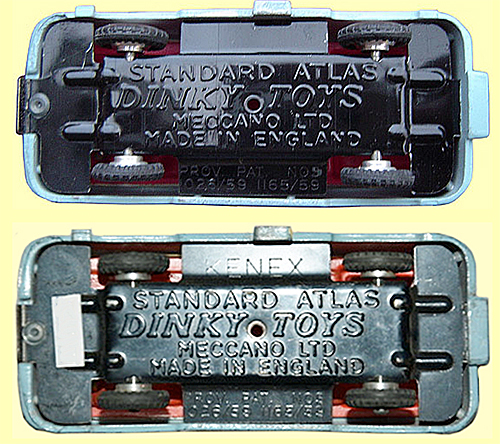
Thanks for your observation - I hadn't noticed this before. I have both colour versions, but neither has "Kenex" on the baseplate. I did a quick 'survey' of Kenebrakes for sale on Ebay, and found the with/without proportion to almost equal across both colour variants, although the all-blue one is a scarcer model than blue/grey. I have to agree with your comments on the supposed "Butlins" version, I believe the author of the article is confusing the Corgi "Holiday Camp Special" Commer minibus (number 508) which was released in July 1968 and deleted in 1969, although this was orange and white, rather than silver, and had no mention of Butlins. The Dinky Atlantean in silver was not released until the Queens' Silver Jubilee in 1977.
I discovered a gross error in the production time of this model when reading this topic. This should not be 1963-1969, but 1960-1965 and that is quite a big time difference !! Model 295 was introduced in Meccano Magazine in May 1960 and appeared in all catalogues from 1960-1965, but no more pictured in 1965. It had disappeared from the catalogues since 1966. I think this error was taken from Patrick Trench's Dinky Toys Compendium 4a and Ramsay's guide also makes the same mistake. It was the first closed vehicle fitted with interior.
There are 2 people who can fix this mistake: 1. The one who created the topic and that's Kevin. 2. The webmaster, but I don't know who that is currently. I hope Kevin is reading this as he can recover this error very easily.
Kind regards, Jan Oldenhuis 30 March 2021.
Hi Jan, any suggestions for corrections like this are always welcome.
'It's getting better all the time'.
I have limited permission to execute corrections like this and it has been done. Kind regards, Jan
Are we sure of the order of use of the Kenex baseplate? I couldn't find an answer in the GB of DT and TMT is closed. The GB of DT does not include a job list of the Meccano drawing dating the change of the baseplate. In MM of May 1960 the Toyman describes the Standard Atlas Bus as an Atlas body with conversion by Kenex. Kenex was a coachbuilder named Kenex Coachwork Limited, Barwick Road, Dover, Kent. Because the name Kenex is engraved on some baseplates, I did some research on internet about what I could find about this company.
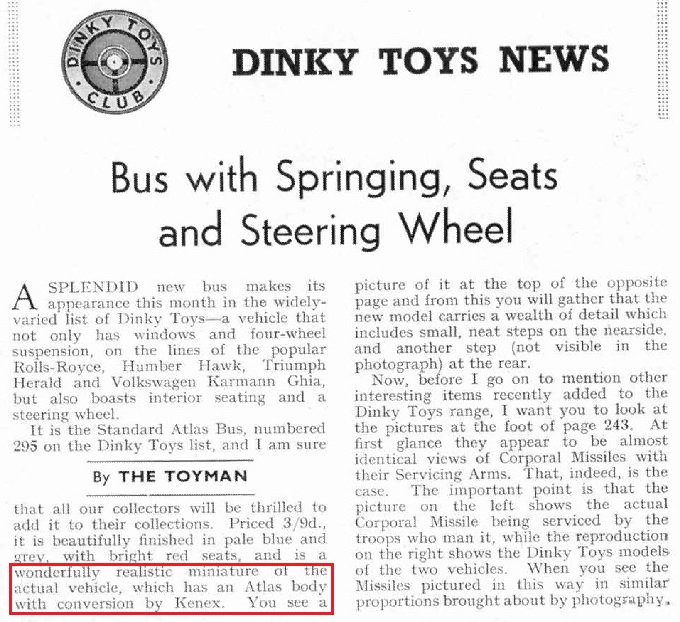
Introduction 295 in MM May 1960 by the Toyman as an Atlas body with conversion by Kenex.
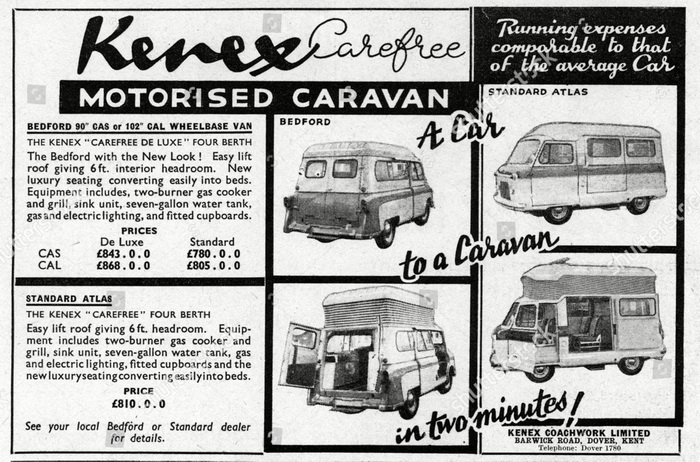
Advertisement Kenex Coachwork Limited, Barwick Road, Dover, Kent with Standard Atlas.
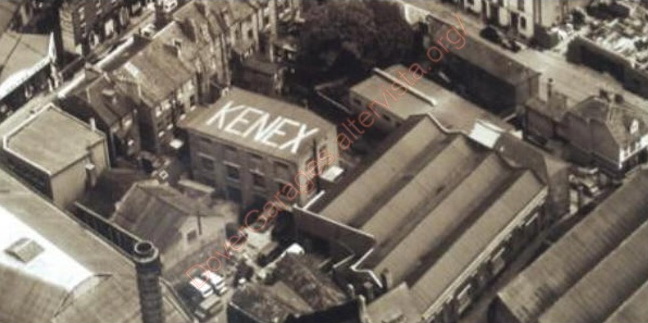
Kenex Coachbuilder Dover.
Brief history of Kenex Coachbuilder Dover: (Source internet)
Kenex were a subsidiary of the Folkestone Motor Company, they were known for converting vans into small coaches.
In April 1951, a building license was successfully obtained by Folkestone Motor Company to redevelop 54-56 Castle Street and the following year Kenex Coachworks Ltd, an associated company, moved in. In the early hours of 27th June 1955, fire broke out and virtually gutted the building. Although a complete renovation took place, but three years later Kenex moved to Coombe Valley Road.
1959-60 Kenex moved to Barwick Road,
1962 - Martin Walter take over Kenex and coachbuilding work at Kenex ceases
Martin Walter take over Kenex, well known for their Dormobile VW motorized caravans and Utilecon passenger vehicles. Martin Walter acquired the goodwill and interest of Kenex Coachwork, Ltd, Barwick Road, Dover, together with all rights associated with Kenex vehicle trade names.
All orders were taken over by Martin Walter Ltd, where vans for conversion are not already at the Kenex, work will be carried out at Martin Walter's Dormobile works at Folkestone.
Coachwork production at the Kenex works ceased on 8th November 1962.
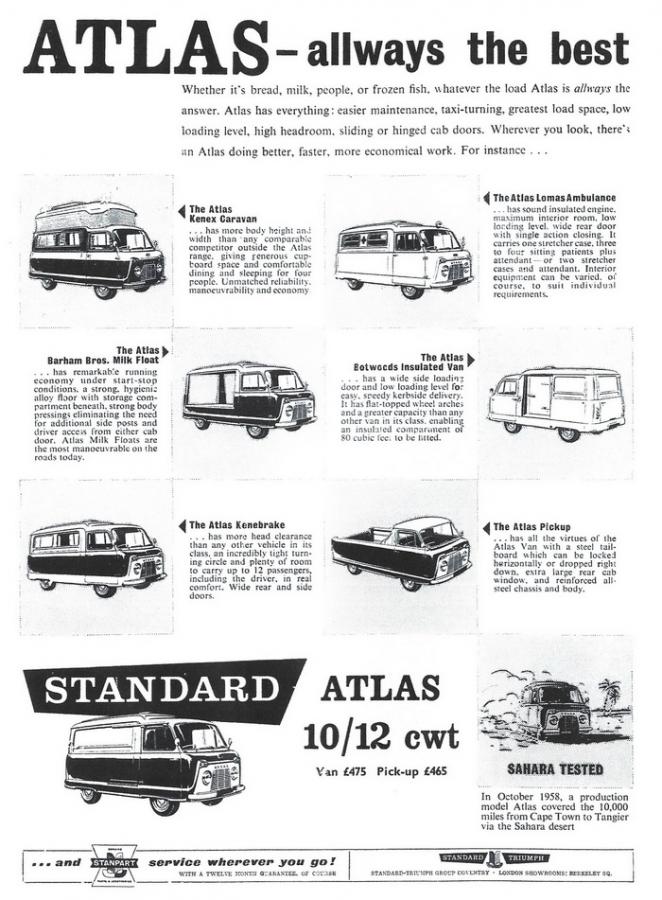
Brochure Standard Atlas Kenebrake June 1960
The Standard Atlas is a light van which was produced and sold under various names between 1958 and 1980, initially in Britain and Europe, and subsequently in India.
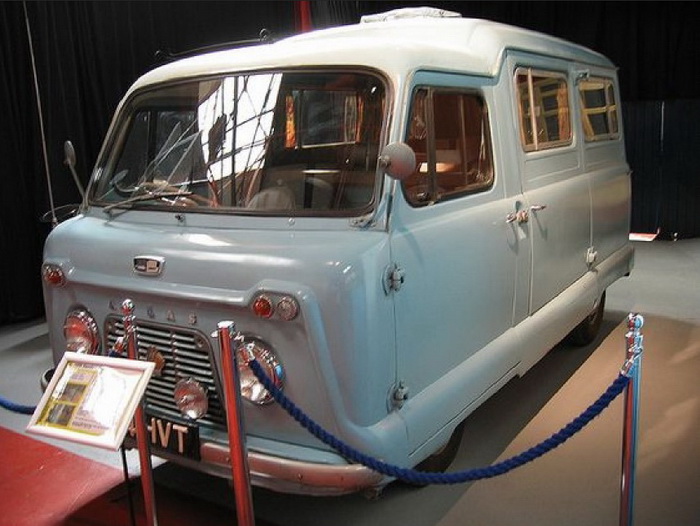
Atlas bus kenebrake in Transport Museum Coventry.
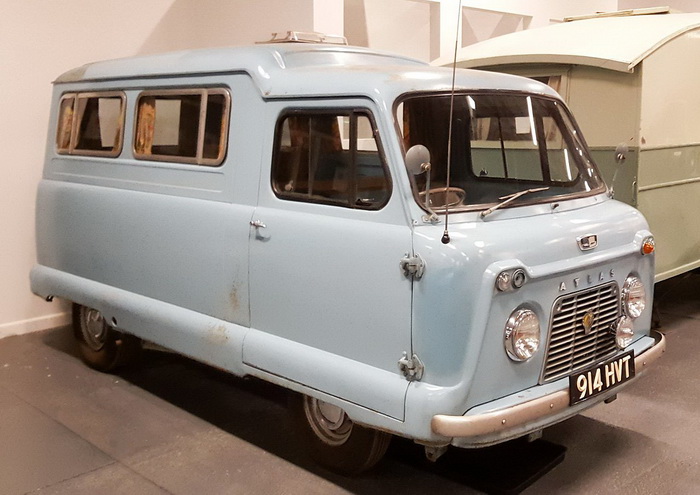
Atlas bus kenebrake in Transport Museum Coventry.
This is a 948 cc Standard Atlas Kenebrake 12 seater built by the Kenex company who took a standard Standard Atlas panel van in primer and applied the necessary conversions which included the Kenebrake Yeoman and Kenebus each with different seat configuration
The Standard Atlas was introduced as a Panel Van and a Pick Up truck with a 15 hp 948cc engine the rather heavy vehicle was clearly under powered and was joined in 1961 by an Atlas Major of 1670 cc which required a re-engineered engine bay still within the cab. In 1963 a LWB Atlas Major was added with an engine of 2138 cc a unit later common to all the Atlas variants
The question remains why the name Kenex did not appear consistently on all baseplates. Was it added on the baseplate from the beginning and later deleted or vice versa?
Does it have to do with Martin Walter's takeover of Kenex in 1962 with the name Dormobile and the end of Coachwork production at the Kenex works on 8th November 1962? Unfortunately, in GB of DT no data from a Meccano drawing can be found that clearly indicates the change of the baseplate. Ramsay doesn't talk about it either. Is the Kenex baseplate dated through stamps in the boxes or prices on the boxes? Even the order of the boxes is not clear to me. In any case, a 295 from the Touring Gift Set 122, issued in the period 1963 and 1964, can provide clarity about whether or not the Kenex baseplate was used in that period.
Given the described history of the Kenex company, it seems most logical to me that the baseplate from the beginning was provided with the name Kenex and after the takeover by Martin Walter's Dormobile in 1962 the name Kenex was omitted. But that's my theory, of which I haven't seen any proof yet.
Jan Oldenhuis, 14 April 2021.
This week I received my 295 Standard Atlas Kenebrake Bus with KENEX engraved into the baseplate. It has a yellow endflap box with model image. This picturebox is very difficult to find. Most have the yellow and red plain box with no image. The 2 stickers on the end flap don't make sense. Those cannot be UK prices. Probably pasted to cover a notation and so called prices written on the stickers. I would like to remove it, but then probably do more damage and don't know what's underneath either. By the way, I don't know any method to remove it without damage to the box either.
This type of box has the end flaps cut on both sides so that the end flap catches behind the side flaps when opened and can easily tear if you are not careful.
Jan Oldenhuis, 7 May 2021
Jan, try brushing acetone* over the stickers that you wish to remove. Let it soak for a few moments, then gently peel them off. Any remaining residue can be removed by gently dabbing with a cotton bud soaked in acetone, which will evaporate leaving no trace. You might like to try it out on something else first - I removed a price labels and clear plastic blister pack from the card backing of a tube of glue, totally without damage, to test the method before using it on something more important.
Kevin.
*Acetone can be bought either from a chemists or as nail varnish remover at a cosmetics counter.
Kevin thanks for the tip. I'll try it out on a letter stamp first.
Jan O.
I recently acquired an Atlas Bus which is claimed by Vectis to be a "rare factory sample issue".
When I compared the ABC logo on the bus with one on the ABC TV Control Room I found them to be identical. I am sure this is a factory decal/transfer.
I had never known of this bus before, has anyone else got any more information?
Probably one to be wary of, those transfers are readily available as reproduction items from a number of sources. I think that if it was a genuine factory trial, there would have been some smaller lettering (in white) referring to ABC Television elsewhere on the van, to match the other two ABC vehicles in the range, and perhaps the blue and grey areas would be reversed, i.e. blue upper body, grey lower, as with the others. Of course, I may be wrong.......
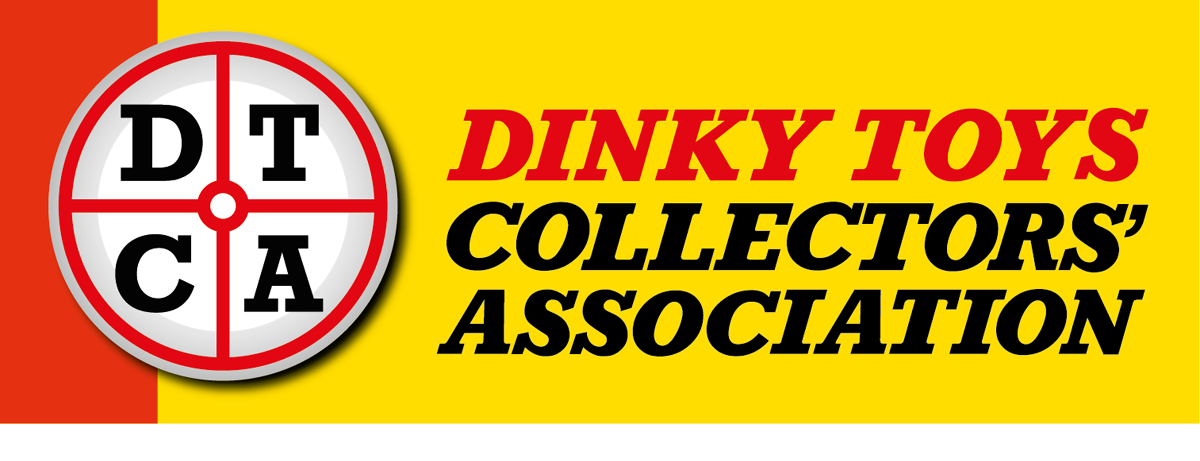

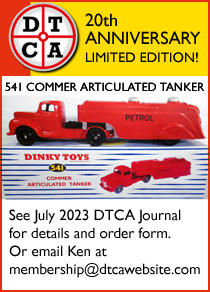
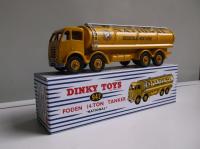
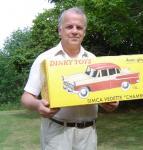

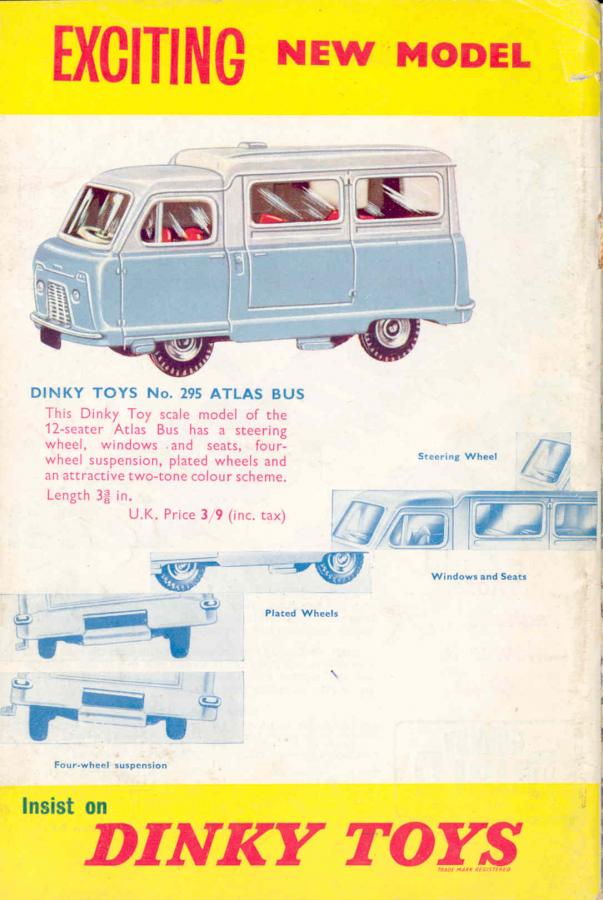



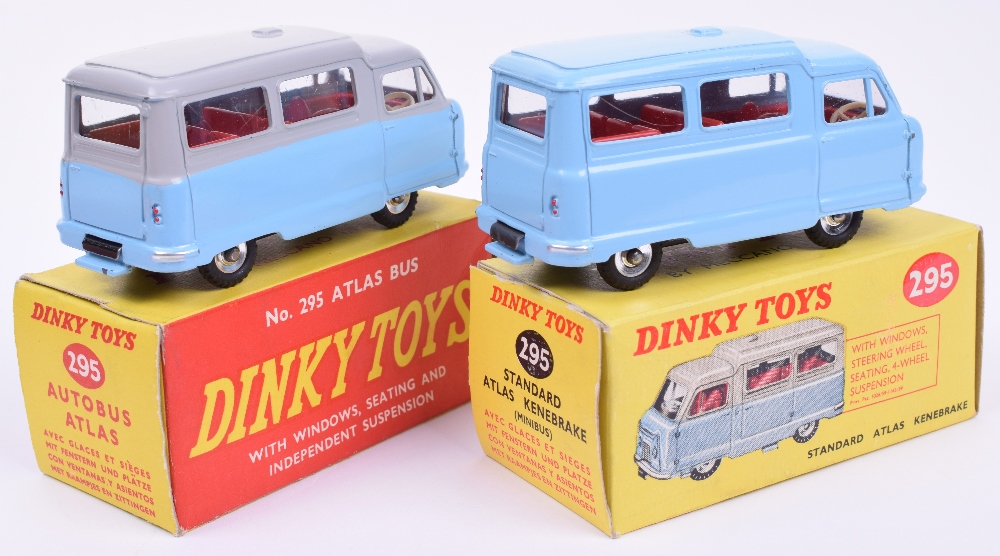

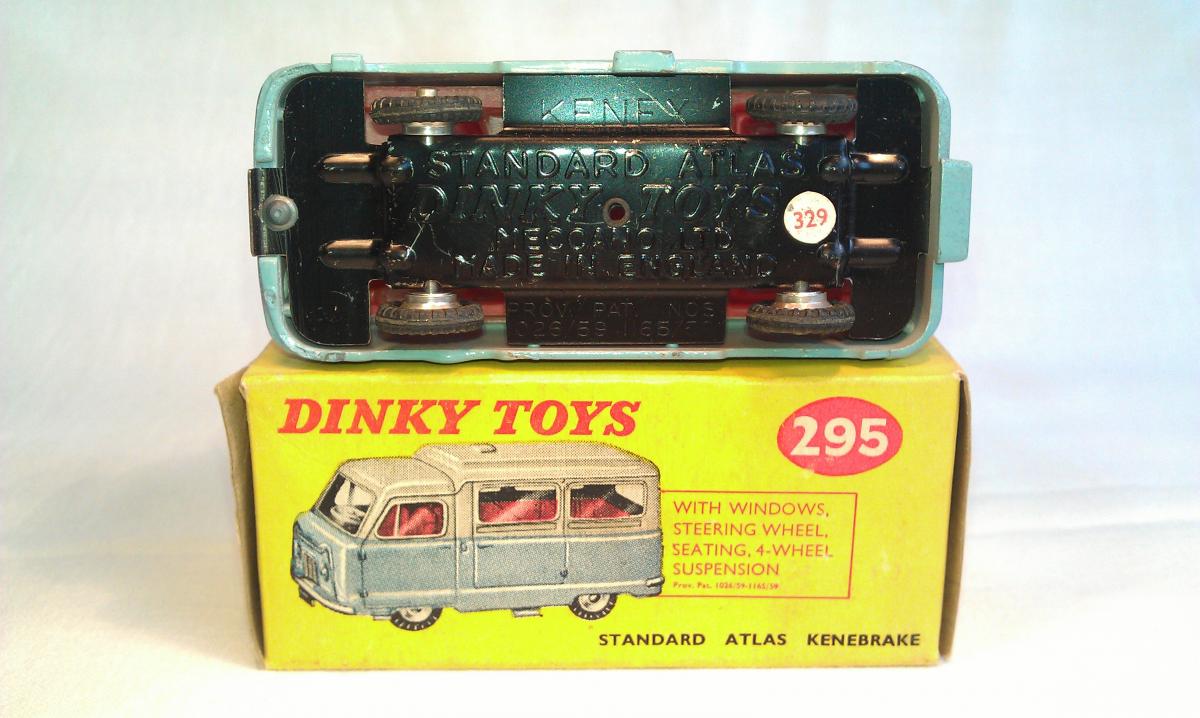

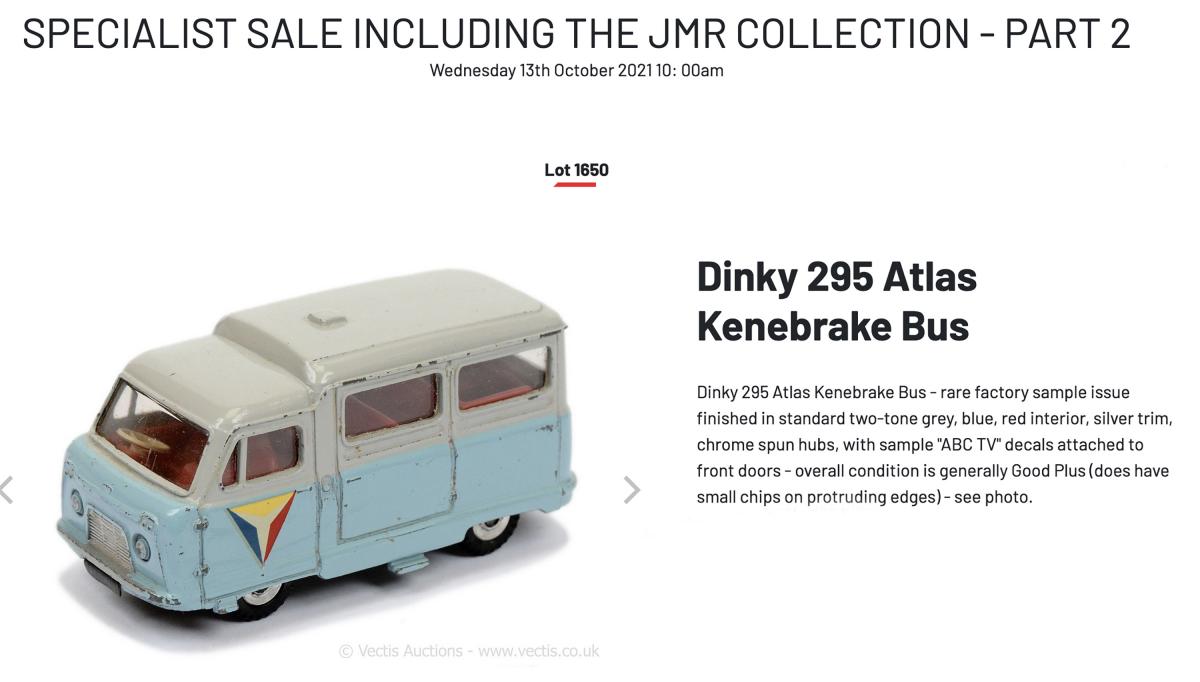
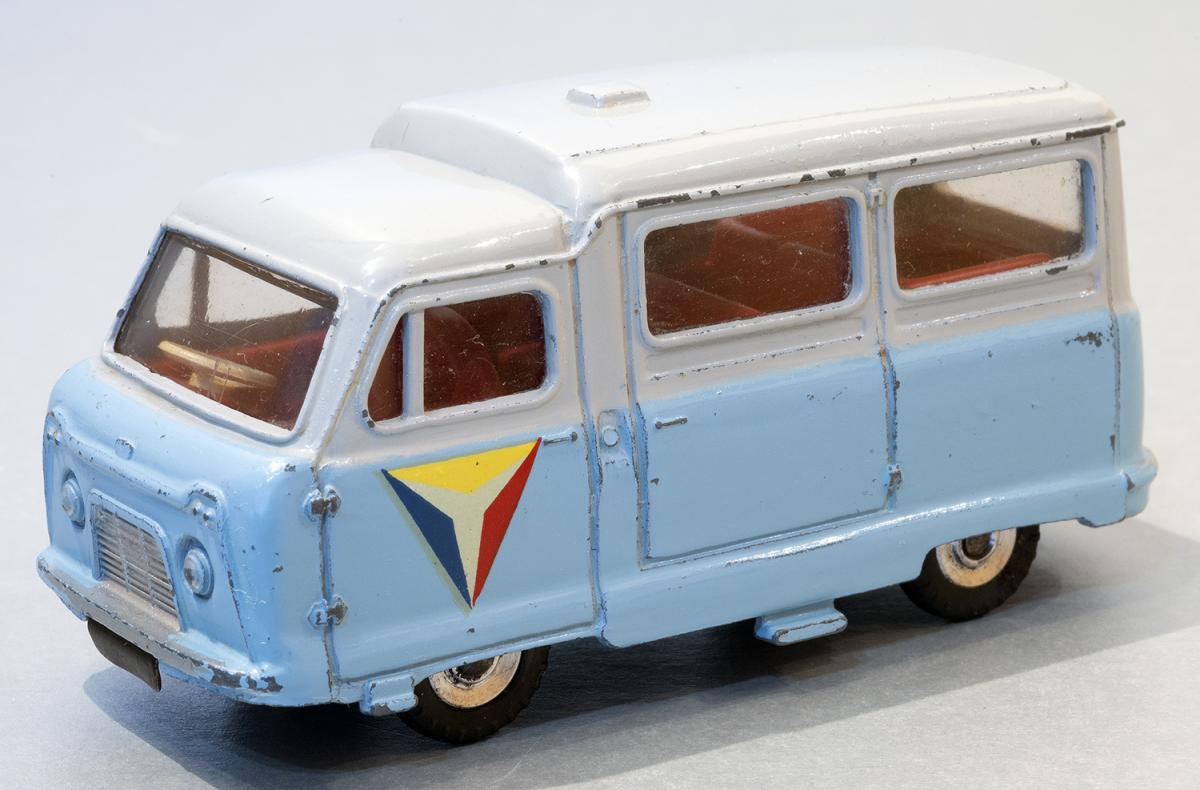
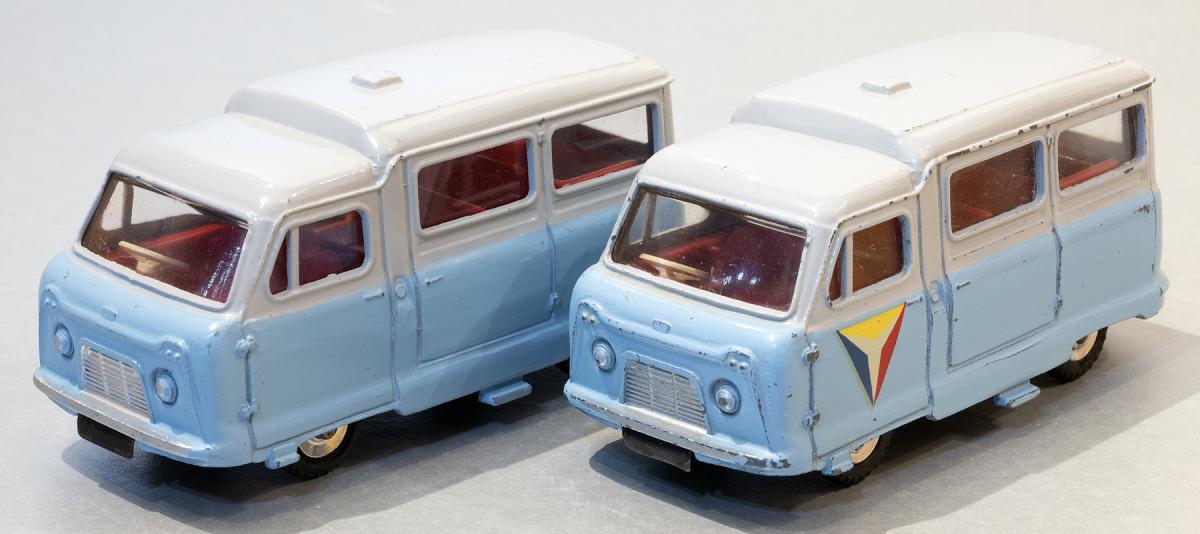
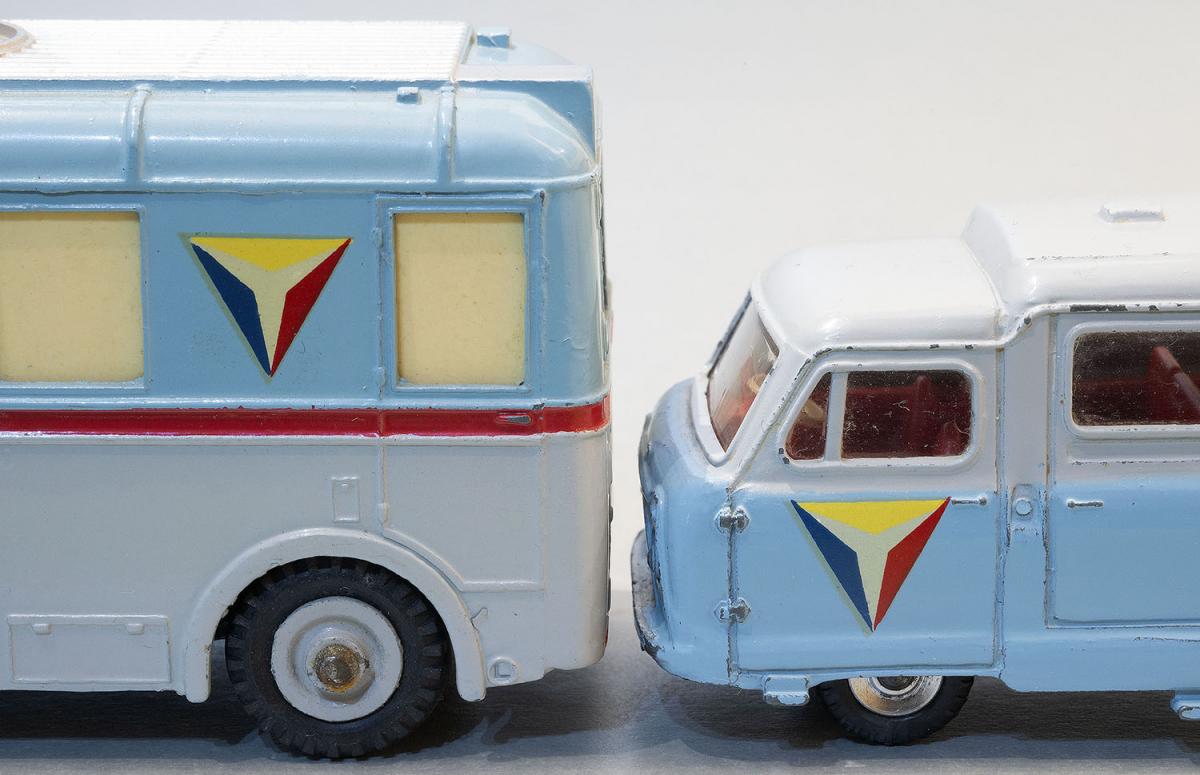
-105c and 383 4-Wheel Hand Truck (1949-1958)
-105c and 383 4-Wheel Hand Truck (1949-1958)
DTCAwebsite upgrade 2023
DTCAwebsite upgrade 2023
DTCAwebsite upgrade 2023
DTCAwebsite upgrade 2023
DTCAwebsite upgrade 2023
DTCAwebsite upgrade 2023
DTCAwebsite upgrade 2023
DTCAwebsite upgrade 2023
DTCAwebsite upgrade 2023
DTCAwebsite upgrade 2023
DTCAwebsite upgrade 2023
DTCAwebsite upgrade 2023
DTCAwebsite upgrade 2023
--22c Motor Truck (1933-50)
--22c Motor Truck (1933-50)
DTCAwebsite upgrade 2023
DTCAwebsite upgrade 2023
Trailer Caravans
Trailer Caravans
DTCAwebsite upgrade 2023
DTCAwebsite upgrade 2023
DTCAwebsite upgrade 2023
DTCAwebsite upgrade 2023
Trailer Caravans
Trailer Caravans
-138 Hillman Imp (1963-73)
-537 Renault 16 TL
-189 Triumph Herald Saloon (1959-64)
-255 Mersey Tunnel Police Van (1955-61)
DTCAwebsite upgrade 2023
-189 Triumph Herald Saloon (1959-64)
-189 Triumph Herald Saloon (1959-64)
-674 Austin Champ (1954-71)